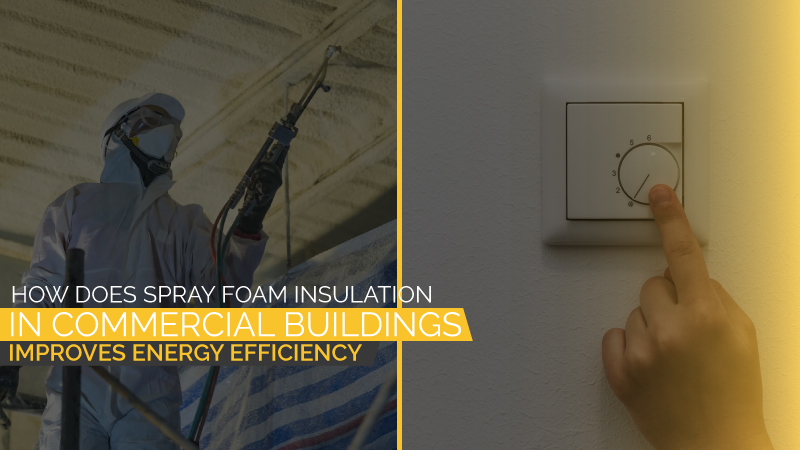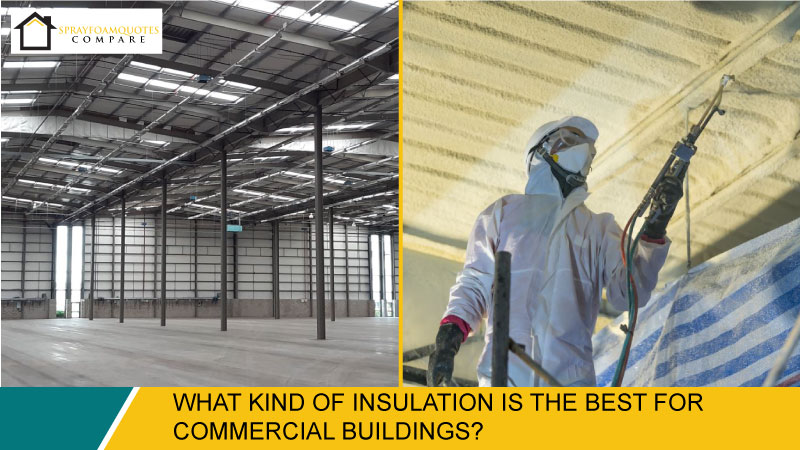Choosing the right kind of insulation for commercial buildings and planning its budget is one of the keys to increasing its efficiency. When considering insulation choices for your commercial building, there are a few important things to consider.
Various kinds of insulation are needed for commercial structures, such as agricultural buildings, warehouses, workplaces, and medical buildings.
Desperately, insulation advantages should hit beyond just being energy efficient, depending on the type of structure and your location.
The experts at Sprayfoamquotescompare suggest that insulating products will not only make a space peaceful and pleasant, but also control dampness and humidity, block out noise, and promote a healthy atmosphere.
A building’s heating and cooling systems operate more efficiently due to proper insulation and use less energy as a result, resulting in cheaper power bills and altogether greener buildings. Insulation choices for commercial buildings include:
- Spray Foam
- Fibreglass Blanket
- Rockwool
- Loose-Fill
- Cavity Wool
- Glass Wool
- Cavity Wall
- Acoustic Wool
It is a crucial part of commercial structures. Understanding each kind of insulation is essential since not only are they not interchangeable, but doing so will assist create a great seal all around, which could result in an investment that saves money?
How does spray foam insulation in commercial buildings improves energy efficiency?

We discuss the R-value of various materials such as walls and ceilings when it comes to energy efficiency. It is more spray foam energy-efficient the higher the value. The reason for this is that a higher number indicates that less air or water can penetrate a given surface.
Spray foam now has an R-value of about 5.3. Concrete is around 1, based on a few other parameters, to put that into context. Spray foam is a very powerful insulation medium. Because after it hardens, it produces an environment that uses less energy.
As a result, your HVAC system can work less laboriously, allowing you to save cash while still maintaining a comfortable environment.
Savings: An investment in spray foam insulation will typically outlast the lifespan of the structure. It is essentially a one-time expense that lasts for a very long time.
Additionally, it requires very little care, so you won’t have to invest a lot of time, energy, or money into keeping the fixture in good shape.
When you combine this with the preceding perk of monthly savings, the installation essentially pays for itself within a short period of time.
Easy Installation: Spray foam insulation is easy to install, as we already stated. That is because all that is required is the hiring of a contractor, who will then proceed to spray the material into the appropriate regions.
But as per the contractors of Spray Foam Quotes Compare, there can be a number of issues caused by an unlicensed contractor applying spray foam insulation improperly. Improperly spraying of the substance, offensive scents, and a lack of adherence are all signs of wrong application.
Insulation with open-cell spray foam in commercial buildings is a cost-effective and high-performance alternative for wall and roof components
Spray foam insulation with open cells has a tested R-value of roughly R-3.5 to R-3.7 per inch, effectively preventing heat transfer.
Because of its lesser density and relative softness compared to denser closed cell insulation, it can seal around the margins and perimeter of bolt cavities and any cracks with greater flexibility. This lighter, softer, and more elastic construction is related to some of the additional advantages of open cell insulation.
For instance, wall components’ sound-absorbing qualities make them better at acoustic control than rigid insulation. Its vapour permeability means that, should water ever enter the assembly for whatever reason; the substance can dry both toward the interiors and exteriors as may be selected.
It does not serve as a food source for mould as a substance, thus it cannot develop in the insulation of a wall assembly. Additionally, when compared to the materials and labour for other types of insulation, the price of open cell spray foam insulation is typically quite appealing and competitive.
Low-density spray foam insulation can indeed be utilised in a variety of typical commercial building insulation envelope locations, including external walls where it is sprayed from the inside against decking or ceiling assemblies where it is sprayed in a similar manner inside of sheathing or roof decks. Due to its inherent airtightness, it can also increase the possibilities for superior performance compared to fibre or rigid board insulation choices.
Spray foam insulation with an open cell for commercial applications has three separate capabilities in a single application, resulting in very high building performance. First, because of its immediate insulating value, it regulates the passage of conductive heat through an assembly. This is made better by the fact that a proper installation not only completely fills all available voids, but that spray foam’s proven R-value is also on par with or better than that of most batt-type insulations.
This means that unlike rigid or batt-type insulation, which may limit or compromise the quantity of insulation installed in typical stud wall cavities, imperfections from framing can be wrapped around in typical stud wall cavities. Spray foam maintains its shape over time, preventing drooping, settling, and other possible incomplete insulation; therefore R-values are also maintained.
The capacity of open cell spray foam to function as a complete, integral air barrier that regulates airflow into and out of building assemblies and the building may be just as important as R-values.
In many buildings, spray foam insulation has actually been employed expressly to close gaps and seal apertures around windows and doors. It has the ability to seal in the air, which makes it a good barrier for reducing the passage of airborne moisture.
The successful design has always sought to keep undesirable dampness out of wall components, therefore these characteristics are important.
Because it has a softer makeup than higher-density foams, it may flex and adjust to maintain an efficient air seal even when a building may expand or contract.
Various benefits that can be derived through a coating of spray foam in commercial buildings include:
• Lower energy use and economical energy bills
• The building’s structural integrity is strengthened
• Buildings are soundproofed with acoustic insulation.
• Provides excellent design flexibility
• Prevents inventory loss
Make sure to utilise quality insulation if you plan to use the commercial building to preserve things for sale because it will affect your inventory. For instance, if wet air enters the premises, it may endanger electronics; taint paper goods, corrupt food, and other objects.
As a result, there could be a significant financial loss because the product is no longer usable. However, you can avoid this by spending money on spray foam insulation.
The moisture level is managed and the products are unharmed because this solution provides an airtight seal. Contact the experts of sprayfoamquotescompare if you are thinking about spray foam insulation for a commercial building or if you have any other inquiries.


